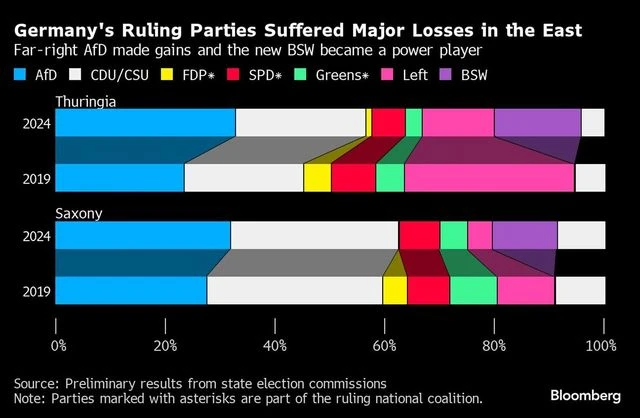)
The BSW sees migrant flows as a potential positive for the economy. | Source: Bloomberg
Sahra Wagenknecht and her new BSW alliance of the far left are set to play a key role in keeping the Alternative for Germany out of power in Thuringia despite the far-right party’s victory in Sunday’s state election there.
The BSW, which wants to curb immigration and stop arming Ukraine, was founded only in January after splitting from the Left party. It came third in the eastern German region with 15.8 per cent of the vote, according to preliminary results, behind the AfD in first place on 32.8 per cent and the conservative Christian Democrats second on 23.6 per cent.
AfD officials in Thuringia say they’re ready to govern a federal state for the first time, but all other parties have shunned it. That makes a coalition led by the CDU with the BSW and the Left party the only path to a majority, though the AfD would still be able to block legislation that need a two-thirds majority to pass such as some judicial appointments.
“We have become a power factor in Germany,” Wagenknecht said Monday at a news conference in Berlin, adding that the BSW has a mandate in both regions to help form governments that “really represent the people again.”
)
During campaigning, Wagenknecht and her party allies slammed the ruling coalition’s military support for the government in Kyiv, which is worth almost €30 billion ($33 billion) in total, including future commitments.
Many voters in eastern Germany are uncomfortable with taking sides in the war and fear the country will be dragged into a wider conflict, opinion polls show.
A recent decision to allow the US to station conventional long-range weapons, including Tomahawk cruise missiles and “developmental hypersonic weapons” in Germany from 2026 has also been condemned by the BSW.
Russian President Vladimir Putin has said Russia could deploy medium and shorter-range strike weapons and increase its naval capabilities if the US executes the plans.
Wagenknecht, who is married to former SPD chairman and finance minister Oskar Lafontaine, also reiterated her criticism of the federal government’s energy policies, which she says have stoked inflation and eroded the purchasing power of wages and pensions.
“It’s no wonder that those in power are punished and they deserved to be punished,” she said.
While the policies of the AfD and BSW overlap in some areas, such as a sympathetic stance toward Russia, the far-right party takes a significantly harder line on immigration.
The BSW sees migrant flows as a potential positive for the economy, while at the same time insisting that they should be controlled. The AfD, which has flirted with the idea of Germany leaving the European Union and mass deportations of non-German citizens, rails against the spread of Islam and wants to restrict the construction of mosques.
The two parties also differ on climate policy. The AfD questions whether climate change is caused by humans and has called for an end to the EU’s Green Deal and for Germany to exit the Paris Climate Agreement. Wagenknecht sees climate change as a serious challenge and recognizes the need to clean up German industry.
With just over a year until the next scheduled national election, they got less than 15 per cent between them in each of the two states. The FDP was nowhere near the 5 per cent threshold for getting into either parliament and the Greens fell short in Thuringia.
With Germany’s economy stagnating and migration a key concern, nationwide support for the three ruling parties has slumped to record lows.
National backing for the conservative CDU/CSU alliance is around 32 per cent — roughly the same as the SPD, Greens and FDP combined — and the AfD is in second place on about 18 per cent.
“The AfD damages Germany,” he said in a statement posted on X. “It is weakening the economy, dividing society and ruining our country’s reputation,” he added. “All democratic parties are now called on to form stable governments without right-wing extremists.”
Optimism that Germany would rebound in 2024 from two years of almost zero growth has faded. An anticipated jump in consumer spending failed to materialize and the country’s industrial sector remains mired in the doldrums.
First Published: Sep 02 2024 | 10:56 PM IST


































